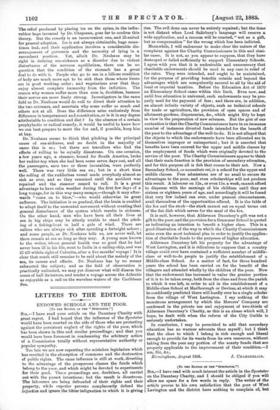LETTERS TO THE EDITOR.
ENDOWED SCHOOLS AND THE POOR
[To THE EDITOR OP THE " SP/IOTA/OR:1 SlIt,—T have read your article on the Dauntsey Charity with great regret. I had hoped that the influence of the Spectator would have been exerted on the side of those who are protesting against the persistent neglect of the rights of the poor, which has been shown in this and similar proceedings ; and that you would have been foremost in condemning the arbitrary action of a Commission totally without representative authority or popular sympathy.
Too late we are now repenting the mistaken legislation which has resulted in the absorption of commons and the destruction of public rights. The same influence is still at work, diverting to the advantage of the prosperous classes the funds which belong to the poor, and which might be devoted to experiments for their good. These proceedings are, doubtless, all carried out with the purest intentions ; but the result is disastrous. The labourers are being defrauded of their rights and their property, while superior persons complacently defend the injustice and ignore the bitter indignation to which it is giving rise. The evil done can never be entirely repaired; but the time is not distant when Lord Salisbury's language will receive a wide application, and a ransom will be exacted, " not as a gift, but as compensation " for the wrong which has been inflicted.
Meanwhile, I will endeavour to make clear the nature of the complaint against the Charity Commissioners in this and simi- lar cases. It is not, as you appear to suppose, that they have destroyed or failed sufficiently to support Elementary Schools. I agree with you that it is undesirable and unnecessary that charitable endowments should be used in any case in relief of the rates. They were intended, and ought to be maintained, for the purpose of providing benefits outside and beyond the advantages which are compulsorily secured to all by the aid of local or imperial taxation. Before the Education Act of 1870 an Elementary School came within this limit. Even now, and until free education is universal, such endowments may be pro- perly used for the payment of fees ; and there are, in addition, an almost infinite variety of objects, such as technical schools for trade or agriculture, the provision of open spaces and of allotment-gardens, dispensaries, &c., which might fitly be kept in view in the preparation of new schemes. But the gist of our contention is that the Charity Commissioners have in an immense number of instances diverted funds intended for the benefit of the poor to the advantage of the well-to-do. It is not alleged that the objects to which the endowments have been allocated are in themselves improper or unimportant ; bat it is asserted that benefits have been secured for the upper and middle classes by the employment of funds which were originally devoted to the service of the poor. The Charity Commissioners appear to think that their main function is the provision of secondary education, and for this purpose all is fish that comes to their net. Now a Secondary School, ex necessitate rei, is a school for the upper and middle classes. Free admissions are of no avail to secure its advantages to the poor, and even scholarships will not produce this result. A labourer on 12s., or even 15s. a week, cannot afford to dispense with the earnings of his children until they are sixteen or eighteen years of age, and accordingly it will be found that very few indeed can ever, under present circumstances, avail themselves of the opportunities offered. It is the fable of the fox and the stork—the stork cannot eat on equal terms out of the flat dish which serves for the meal of the fox.
It is said, however, that Alderman Dauntsey's gift was not a gift to the poor, and the provision for a Grammar School is quoted as indicating an intention to benefit a higher class. This is a good illustration of the way in which the Charity Commissioners seize even the most technical plea in order to justify the applica- tion of charitable funds to the purposes of higher education.
Alderman Dauntsey left his property for the advantage of West Lavington, and it is ridiculous to suppose that a country village could ever have contained a sufficient number of middle- class or well-to-do people to justify the establishment of a Middle-class School. As a matter of fact, for three hundred years the school has been carried on for the benefit of the villagers and attended wholly by the children of the poor. Now that the endowment has increased in value the greater portion of it is to be taken away, both from the class and from the parish to which it was left, in order to aid in the establishment of a Middle-class School at Marlborough or Devizes, at which it may be confidently predicted there will hardly ever be a single scholar from the village of West Lavington. I say nothing of the monstrous arrangement by which the Mercers' Company are confirmed in the private use and enjoyment of two-thirds of Alderman Dauntsey's Charity, as this is an abuse which will, I hope, be dealt with when the reform of the City Guilds is seriously undertaken.
In conclusion, I may be permitted to add that secondary education has no warmer advocate than myself ; but I think that the class to which I belong is rich enough and liberal enough to provide for its wants from its own resources, without taking from the poor any portion of the scanty funds that are properly applicable to the improvement of their condition.—I
am, Sir, &c.,


































 Previous page
Previous page